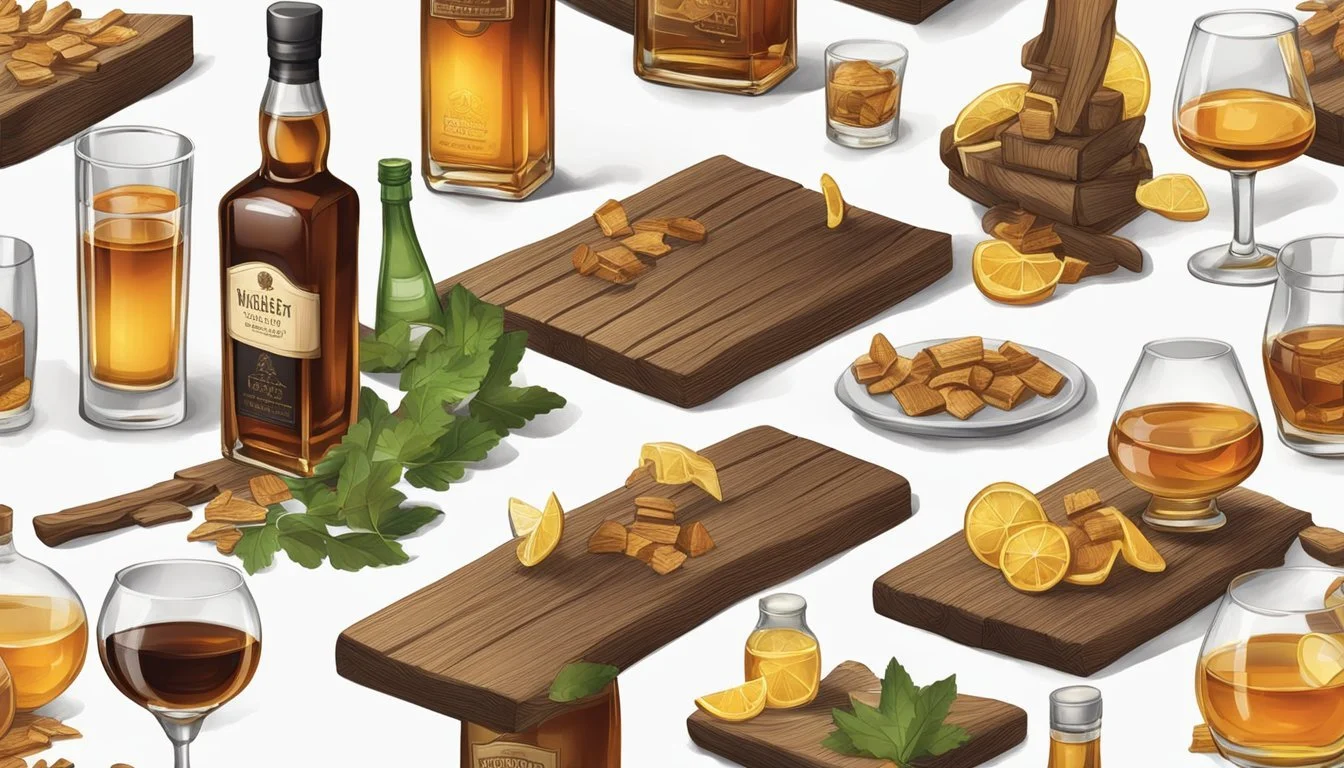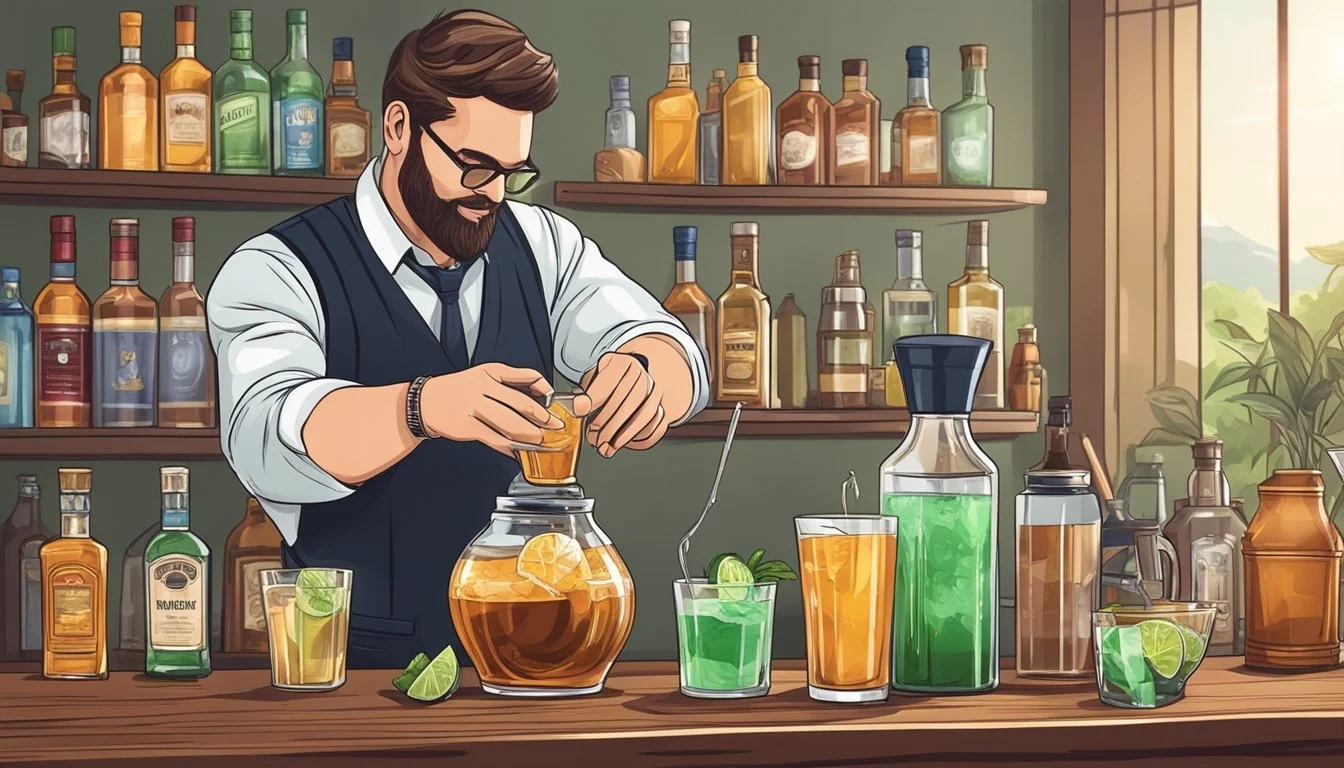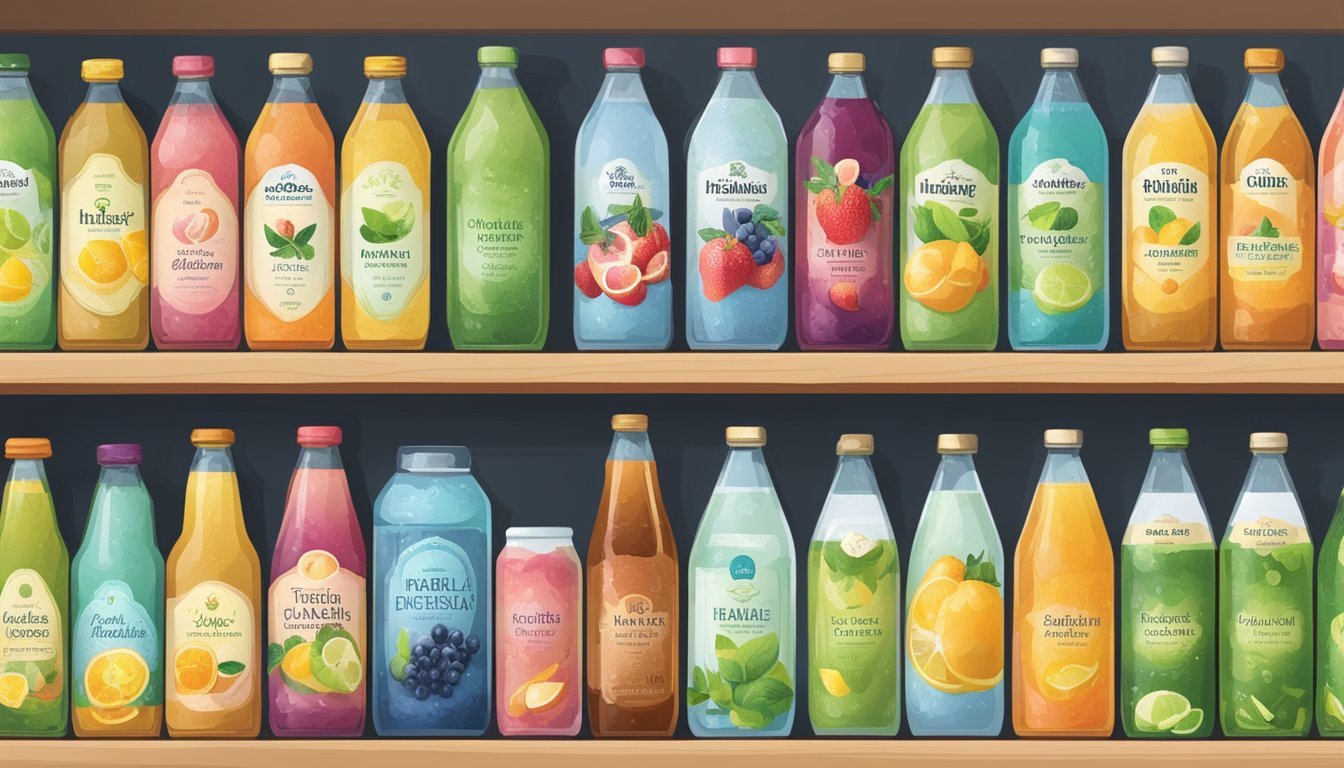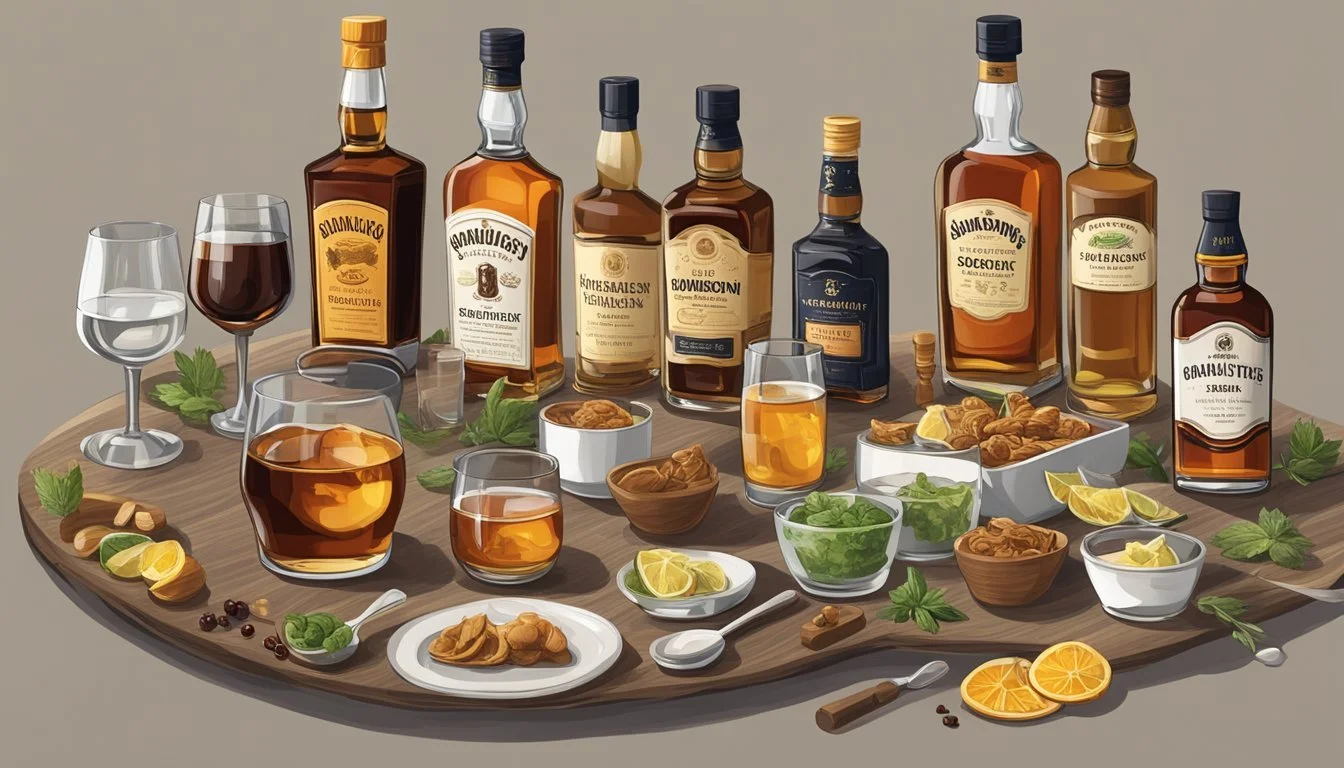Whiskey Substitutes
Top Alternatives for Your Cocktails
Whiskey is a complex spirit known for its rich flavors and warming qualities, making it a favorite in cocktails and culinary applications. However, there are times and situations where an alcohol-free alternative is desired. Non-drinkers, those reducing alcohol intake, and hosts seeking to provide inclusive beverage options have given rise to a variety of non-alcoholic whiskey substitutes. These alternatives aim to replicate the distinctive taste of whiskey, providing the essence of the spirit without the intoxicating effects.
The market now offers a range of non-alcoholic spirits that mimic traditional whiskey, from smoky and peaty to smooth and sweet profiles. Some are crafted by established non-alcoholic beverage producers who use intricate processes to capture the essence of whiskey flavors. Ingredients like apple juice or other natural components are sometimes used as substitutes in recipes to emulate whiskey's depth. These products often appeal to health-conscious individuals, as many are low in calories and free from gluten, sugar, and artificial sweeteners.
When selecting a non-alcoholic whiskey alternative, consumers look for quality and authenticity in flavor. They want options that perform well in both standalone sipping and as cocktail components, offering a comparable experience to alcoholic whiskey. With the growth in the zero-proof whiskey niche, the variety available allows individuals to enjoy whiskey-like beverages and dishes while adhering to their dietary preferences or lifestyle choices.
The Basics of Whiskey
Whiskey is a distilled alcoholic beverage made from fermented grain mash. Various grains are used for different varieties, including barley, corn, rye, and wheat. The process of making whiskey involves malting the grain, mashing it, fermenting it, distilling it, and then aging it in wooden casks, typically made of oak.
Types of Whiskey:
Bourbon: Originating from the United States, primarily Kentucky, bourbon is made from at least 51% corn, giving it a distinctly sweet flavor.
Scotch: Scotch whisky, often simply called scotch, is made primarily from malted barley and must be aged in oak barrels for at least three years in Scotland.
Rye Whiskey: This type of whiskey is primarily made in North America with at least 51% rye in the grain mash, offering a spicier and fruitier flavor profile.
Aging Process:
The aging process in whiskey is vital as it contributes to the flavor and character of the beverage. During this period, the whiskey develops its color, complexity, and taste profiles through interactions with the oak wood.
Distillation:
Whiskey’s alcohol content is increased through distillation. The specific type of still used can influence the final flavor.
Each type of whiskey has regional variations and legal definitions that distillers must adhere to. For instance, Scotch must be distilled in Scotland, and bourbon typically hails from the southern United States, notably Kentucky.
These regulations and practices shape the quality and uniqueness of whiskey, from its geographic significance to its rich taste.
Non-Alcoholic Whiskey Alternatives
Exploring non-alcoholic whiskey alternatives offers an opportunity for individuals to enjoy the complexity and flavor profiles of whiskey without the alcohol content. These alternatives have been crafted to mimic the taste, style, and aroma of traditional whiskey.
Seedlip and Other Brands
Seedlip is a pioneer in the non-alcoholic spirits market, known for crafting herbal and nuanced flavors. Monday Zero Alcohol Whiskey provides a smoky alternative, created for those who appreciate the scotch experience. Ritual Zero Proof Whiskey, on the other hand, is celebrated for its use in Manhattans due to its close approximation to the original spirit. Lyre’s American Malt impresses with flavors closely resembling whiskey and Spiritless Kentucky 74 pitches itself as a premium non-alcoholic bourbon alternative. Sexy AF’s Friski Whiski and Gnista Barreled Oak also offer options for those seeking the whiskey experience sans alcohol.
Notable Brands:
Seedlip
Monday Zero Alcohol Whiskey
Ritual Zero Proof Whiskey
Lyre’s American Malt
Spiritless Kentucky 74
Sexy AF’s Friski Whiski
Gnista Barreled Oak
Homemade Substitutes
For those who prefer a DIY approach, homemade whiskey substitutes can be created using common ingredients such as vanilla extract, molasses, and apple cider. These give the depth and sweetness often associated with whiskey. Adding richness to the concoction, elements like honey or citrus can be incorporated to enhance the overall profile. Juices like apple juice, grape juice, or even lemonade can serve as a base for these homemade blends, imitating some of the fruity undertones found in certain whiskeys.
Factors to Consider in Substitutes
When selecting a non-alcoholic whiskey alternative, consider the taste—whether it should lean more toward sweetness or have a bitter edge. The style of the whiskey, whether it's more like a bourbon, scotch, or a rye, will influence the choice. Aroma is critical, as much of the whiskey experience is olfactory. For mixing in cocktails, ensure the substitute complements the other ingredients without overpowering them. Lastly, for the best experience, the substitute should offer a complexity reminiscent of alcohol-based whiskey, without a simple, sugary taste.
Cocktail Adaptations with Substitutes
When seeking alternatives for whiskey in cocktails, the key is to match the complexity and nuances of whiskey's flavor profile. Here are some effective ways one can adapt classic cocktails and create delightful mocktails using suitable substitutes.
Mocktail Recipes
Mocktail versions of whiskey-based cocktails can be rewarding for those avoiding alcohol. A non-alcoholic Manhattan can be crafted using a blend of non-alcoholic spirit alternatives, such as Spiritless Kentucky 74, along with vermouth and bitters to mimic the traditional complexity. Similarly, creating a booze-free Old Fashioned involves using alcohol-free whiskey alternatives with dashes of bitters, a sugar cube, and citrus zest.
Non-Alcoholic Manhattan: Combine spirit substitute, non-alcoholic sweet vermouth, bitters.
Booze-Free Old Fashioned: Mix whiskey substitute, sugar, bitters, orange zest.
Pairing Substitutes with Mixers
When non-alcoholic spirits are used, one has to consider how they pair with mixers. Ginger ale and cola are versatile and often bring out the spicy notes in whiskey substitutes. Adding a touch of apple cider vinegar or various syrups can enhance the complexity of flavors.
Rye Ginger Fizz: Use Old Tom gin alternative, ginger syrup, lime juice, soda.
Rye Cherry Smash: Opt for Old Tom gin alternative, cherry syrup, lemon juice, soda.
Using Substitutes in Classic Whiskey Cocktails
One can also integrate whiskey substitutes into classic whiskey cocktails. Manhattans and Whiskey Sours can be created using non-alcoholic bourbon that boasts notes of caramel, vanilla, and oak. Use a cocktail shaker to combine these alternatives with traditional ingredients to emulate the original drink's taste.
Whiskey Sour: Shake non-alcoholic whiskey, lemon juice, simple syrup, egg white (optional).
Mock Manhattan: Stir non-alcoholic whiskey, non-alcoholic vermouth, bitters, cherry.
Adjusting the Flavor Profile
Adjusting the flavor profile can be done by incorporating elements such as balsamic vinegar, which offers a depth similar to whiskey’s acidity and sweetness. Spices like cinnamon and vanilla can emulate whiskey's warm undertones when creating hot toddies or a booze-free Old Fashioned.
Add a dash of balsamic vinegar to mocktails for depth.
Infuse cinnamon and vanilla in tea-based adaptations for warmth.
Adapting for Tea and Coffee
Tea and coffee can serve as robust bases for whiskey substitutes. They naturally contain complex flavors that can simulate whiskey's depth. Spice 94, a non-alcoholic spirit, offers a blend of aromatic spices that work well with both tea and coffee as a substitute, contributing richness and layering flavors.
Tea-Based Hot Toddy: Brew a strong tea, add Spice 94, honey, and lemon.
Coffee Old-Fashioned: Mix brewed coffee, whiskey substitute, simple syrup, and a twist of orange peel.
Cooking and Baking with Whiskey Substitutes
When whiskey is unavailable or unsuitable for a recipe, a proper substitute can impart similar depth and complexity. The key is selecting an alternative that harmonizes with the specific components of your culinary creation.
Selecting Substitutes for Culinary Use
A chef must approach the substitution of whiskey in the kitchen with careful consideration. Apple cider vinegar can be utilized for its acidic sharpness in marinades, while vanilla extract offers a sweet and aromatic quality in baking. For a robust flavor akin to whiskey's richness, molasses is an excellent addition. Each substitute should complement the dish's flavor profile without overwhelming it.
Incorporating into Desserts
Desserts (What wine goes well with desserts?) often benefit from whiskey's unique caramel and vanilla notes. In its absence, natural ingredients such as vanilla extract or various syrups can be appropriate replacements. For instance, in a recipe requiring whiskey, the same quantity of vanilla syrup can be used to achieve a comparable sweetness and depth. One should experiment to find the right balance, ensuring the dessert's taste and texture remain as intended.
Enhancing Savory Dishes
Whiskey can be an integral component in savory dishes, particularly meat dishes and marinades. Chefs may use alternatives like non-alcoholic syrups to mimic the sweetness of whiskey or select different types of vinegar for a tangy twist. It's important to match the intensity of the whiskey flavor, so bolder substitutes like apple cider vinegar might be used sparingly, while more decadent syrups can be applied more liberally, keeping in mind the original purpose of the whiskey in the dish.
Health Considerations of Substitutes
When exploring whiskey substitutes, one's health is a primary concern. This section delves into the advantages of non-alcoholic options and considers potential dietary allergies and intolerances related to whiskey alternatives.
Benefits of Non-Alcoholic Options
Non-alcoholic whiskey and zero-proof spirits offer several health benefits. They eliminate the risk of alcohol-related health complications, which is crucial for individuals who abstain for health or personal reasons. Non-alcoholic alternatives also cater to those who wish to enjoy the social aspect of drinking without the effects of alcohol, including:
No risk of liver damage or heart disease typically associated with excessive alcohol consumption.
Safety for designated drivers and people prioritizing sobriety.
Navigating Allergies and Intolerances
When selecting non-alcoholic spirits, individuals may need to consider allergies and intolerances to certain ingredients. It's important to:
Check ingredient lists thoroughly for potential allergens.
Be aware of common allergens in flavorings such as nuts and gluten.
Consumer Resources
When exploring non-alcoholic whiskey alternatives, consumers have valuable resources at their disposal to make informed decisions. These include expert tasting notes and comprehensive reviews, as well as comparative data on brands and prices.
Tasting Notes and Reviews
The efficacy of a non-alcoholic whiskey substitute often hinges on how closely it mimics the taste profile of traditional whiskey. For instance, Ritual Zero Proof Whiskey Alternative has been commended for its close approximation to the classic whiskey flavor, offering floral notes that some consumers might find appealing. Enthusiasts can find detailed tasting notes and reviews on platforms like the Food Network, where various non-alcoholic spirits, including Ritual, have been evaluated.
One should not overlook Spiritless Kentucky 74, for this brand has made strides in crafting a complex flavor that resonates well with those desiring a bourbon-like experience without the alcohol. Each product generally garners a mix of professional critiques and consumer reviews that highlight taste, mouthfeel, and mixability, allowing potential buyers to gauge which brand suits their palate.
Comparing Brands and Prices
Comparing brands and prices is straightforward with many retailers and review sites providing side-by-side comparisons. For price-oriented consumers, there's a range of options, from premium choices like Gnista Barreled Oak, known for its distinctive oak-influenced profile, to more value-oriented products. The table below presents a comparison of popular non-alcoholic whiskey alternatives:
Brand Average Price Notable Characteristics Ritual Zero Proof Whiskey $29.99 Floral flavoring, well-regarded producer Spiritless Kentucky 74 Varies Complex flavor, bourbon-like Gnista Barreled Oak Premium Oak-influenced, unique taste
Prices are subject to change and can vary by retailer. Consumers are advised to check multiple sources to find the best deal. Additionally, many brands provide sample packs or miniature bottles, which is an excellent way to rate and assess different products without a significant financial commitment.
Cultural and Lifestyle Considerations
The incorporation of whiskey into cultural and lifestyle aspects extends beyond consumption, influencing home decor trends as well as permeating popular culture and media.
Whiskey as Part of Home Decor
In many homes, whiskey serves not only as a beverage but also as a statement piece that manifests one's aesthetic tastes and hospitality. Bar carts and display cabinets, often featuring a meticulously curated selection of whiskey bottles and elegant glassware, have become focal points in interior design. These arrangements convey a sense of sophistication and an appreciation for the ritual of serving drinks. Moreover, vintage whiskey bottles are frequently upcycled into unique home decor items like lamp bases or planters, adding character to living spaces.
Whiskey in Popular Culture and Media
Whiskey has long enjoyed a storied presence in entertainment, deeply ingrained in the backdrop of countless films, television shows, and literature. It often symbolizes complexity and earthiness of characters, particularly in genres like film noir and crime fiction. In travel and lifestyle media, whiskey-related experiences, such as distillery tours and tasting sessions, are regularly highlighted as must-do activities for connoisseurs and casual enthusiasts alike. These experiences are considered an essential exploration of local culture and history, especially within regions famed for their whiskey production.





